12 start with D start with D
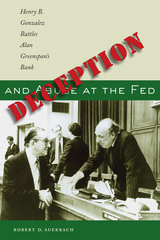
The Federal Reserve—the central bank of the United States—is the most powerful peacetime bureaucracy in the federal government. Under the chairmanship of Alan Greenspan (1987-2006), the Fed achieved near mythical status for its part in managing the economy, and Greenspan was lauded as a genius. Few seemed to notice or care that Fed officials operated secretly with almost no public accountability. There was a courageous exception to this lack of oversight, however: Henry B. Gonzalez (D-TX)—chairman of the U.S. House of Representatives Financial Services (banking) Committee.
In Deception and Abuse at the Fed, Robert Auerbach, a former banking committee investigator, recounts major instances of Fed mismanagement and abuse of power that were exposed by Rep. Gonzalez, including:
- Blocking Congress and the public from holding powerful Fed officials accountable by falsely declaring—for 17 years—it had no transcripts of its meetings;
- Manipulating the stock and bond markets in 1994 under cover of a preemptive strike against inflation;
- Allowing $5.5 billion to be sent to Saddam Hussein from a small Atlanta branch of a foreign bank—the result of faulty bank examination practices by the Fed;
- Stonewalling Congressional investigations and misleading the Washington Post about the $6,300 found on the Watergate burglars.
Auerbach provides documentation of these and other abuses at the Fed, which confirms Rep. Gonzalez's belief that no government agency should be allowed to operate with the secrecy and independence in which the Federal Reserve has shrouded itself. Auerbach concludes with recommendations for specific, broad-ranging reforms that will make the Fed accountable to the government and the people of the United States.
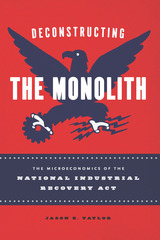
The NIRA is generally viewed as a monolithic program, its dramatic and sweeping effects best measurable through a macroeconomic lens. In this pioneering book, however, Jason E. Taylor examines the act instead using microeconomic tools, probing the uneven implementation of the act’s codes and the radical heterogeneity of its impact across industries and time. Deconstructing the Monolith employs a mixture of archival and empirical research to enrich our understanding of how the program affected the behavior and well-being of workers and firms during the two years NIRA existed as well as in the period immediately following its demise.
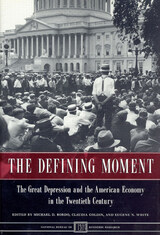
The essays consider whether New Deal-style legislation continues to operate today as originally envisioned, whether it altered government and the economy as substantially as did policies inaugurated during World War II, the 1950s, and the 1960s, and whether the legislation had important precedents before the Depression, specifically during World War I. Some chapters find that, surprisingly, in certain areas such as labor organization, the 1930s responses to the Depression contributed less to lasting change in the economy than a traditional view of the time would suggest. On the whole, however, these essays offer testimony to the Depression's legacy as a "defining moment." The large role of today's government and its methods of intervention—from the pursuit of a more active monetary policy to the maintenance and extension of a wide range of insurance for labor and business—derive from the crisis years of the 1930s.
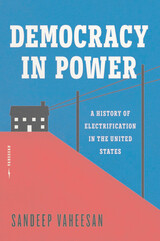
Private money, public good, and the original fight for control of America’s energy industry.
Until the 1930s, financial interests dominated electrical power in the United States. That changed with President Franklin D. Roosevelt’s New Deal which restructured the industry. The government expanded public ownership, famously through the Tennessee Valley Authority, and promoted a new kind of utility: the rural electric cooperative that brought light and power to millions in the countryside. Since then, public and cooperative utilities have persisted as an alternative to shareholder control. Democracy in Power traces the rise of publicly governed utilities in the twentieth-century electrification of America.
Sandeep Vaheesan shows that the path to accountability in America’s power sector was beset by bureaucratic challenges and fierce private resistance. Through a detailed and critical examination of this evolution, Vaheesan offers a blueprint for a publicly led and managed path to decarbonization. Democracy in Power is at once an essential history, a deeply relevant accounting of successes and failures, and a guide on how to avoid repeating past mistakes.

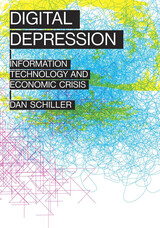
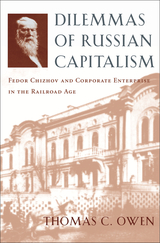
Fedor Chizhov built the first railroad owned entirely by Russian stockholders, created Moscow’s first bank and mutual credit society, and launched the first profitable steamship line based in Archangel. In this valuable book, Thomas Owen vividly illuminates the life and world of this seminal figure in early Russian capitalism.
Chizhov condemned European capitalism as detrimental to the ideal of community and the well-being of workers and peasants. In his strategy of economic nationalism, Chizhov sought to motivate merchants to undertake new forms of corporate enterprise without undermining ethnic Russian culture. He faced numerous obstacles, from the lack of domestic investment capital to the shortage of enlightened entrepreneurial talent. But he reserved his harshest criticism for the tsarist ministers, whose incompetence and prejudice against private entrepreneurship proved his greatest hindrance.
Richly documented from Chizhov’s detailed diary, this work offers an insightful exploration of the institutional impediments to capitalism and the rule of law that plagued the tsarist empire and continue to bedevil post-Soviet Russia.
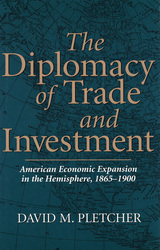
The move to encourage trade with Canada and Mexico during the 1990s, culminating with the negotiation of the North American Free Trade Agreement (NAFTA), has had a long background extending as far back as the late eighteenth century. American trade with both Canada and Latin America rapidly increased during the last third of the nineteenth century as a result of burgeoning industry and agriculture in the United States. The Diplomacy of Trade and Investment is the first detailed examination of the economic and political forces behind this rapid growth and their effect on government policy.
Based on a thorough examination of government documents, congressional debates and reports, private papers of government and business leaders, and newspapers, David M. Pletcher begins this monumental study with a comprehensive survey of U.S. trade following the Civil War. He goes on to outline the problems of building a coherent trade policy toward Canada, Mexico, Central America, the Caribbean, and South America. The study concludes by analyzing a series of abortive trade reform efforts and examining the effects of the Spanish-American War.
Pletcher rejects the long-held belief that American business and government engaged in a deliberate, consistent drive for economic hegemony in the hemisphere during the late 1800s. Instead he finds that the American government improvised and experimented with ways to further trade expansion. But American businessmen were often more interested in domestic trade than in trade with foreign markets. In fact, many of them resisted efforts to lower the American tariff or otherwise encourage American trade abroad.
The combination of traditionalist and revisionist insight with Pletcher's own deep knowledge and research provides the reader with a comprehensive new interpretation of hemispheric trade expansion at the end of the nineteenth century.

Economists celebrate the market as a device for regulating human interaction without acknowledging that their enthusiasm depends on a set of half-truths: that individuals are autonomous, self-interested, and rational calculators with unlimited wants and that the only community that matters is the nation-state. However, as Stephen A. Marglin argues, market relationships erode community. In the past, for example, when a farm family experienced a setback—say the barn burned down—neighbors pitched in. Now a farmer whose barn burns down turns, not to his neighbors, but to his insurance company. Insurance may be a more efficient way to organize resources than a community barn raising, but the deep social and human ties that are constitutive of community are weakened by the shift from reciprocity to market relations.
Marglin dissects the ways in which the foundational assumptions of economics justify a world in which individuals are isolated from one another and social connections are impoverished as people define themselves in terms of how much they can afford to consume. Over the last four centuries, this economic ideology has become the dominant ideology in much of the world. Marglin presents an account of how this happened and an argument for righting the imbalance in our lives that this ideology has fostered.

Probing the relationship between German political economy and everyday fiscal administration, The Disordered Police State focuses on the cameral sciences—a peculiarly German body of knowledge designed to train state officials—and in so doing offers a new vision of science and practice during the seventeenth and eighteenth-centuries. Andre Wakefield shows that the cameral sciences were at once natural, technological, and economic disciplines, but, more important, they also were strategic sciences, designed to procure patronage for their authors and good publicity for the German principalities in which they lived and worked. Cameralism, then, was the public face of the prince's most secret affairs; as such, it was an essentially dishonest enterprise.
In an entertaining series of case studies on mining, textiles, forestry, and universities, Wakefield portrays cameralists in their own gritty terms. The result is a revolutionary new understanding about how the sciences created and maintained an image of the well-ordered police state in early modern Germany. In raising doubts about the status of these German sciences of the state, Wakefield ultimately questions many of our accepted narratives about science, culture, and society in early modern Europe.

Divided Mastery explores a curiously neglected aspect of the history of American slavery: the rental of slaves. Though few slaves escaped being rented out at some point in their lives, this is the first book to describe the practice, and its effects on both slaves and the peculiar institution.
Martin reveals how the unique triangularity of slave hiring created slaves with two masters, thus transforming the customary polarity of master-slave relationships. Drawing upon slaveholders' letters, slave narratives, interviews with former slaves, legislative petitions, and court records, Divided Mastery ultimately reveals that slave hiring's significance was paradoxical.
The practice bolstered the system of slavery by facilitating its spread into the western territories, by democratizing access to slave labor, and by promoting both production and speculation with slave capital. But at the same time, slaves used hiring to their advantage, finding in it crucial opportunities to shape their work and family lives, to bring owners and hirers into conflict with each other, and to destabilize the system of bondage. Martin illuminates the importance of the capitalist market as a tool for analyzing slavery and its extended relationships. Through its fresh and complex perspective, Divided Mastery demonstrates that slave hiring is critical to understanding the fundamental nature of American slavery, and its social, political, and economic place in the Old South.
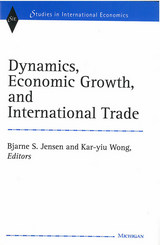
The work collected here serves to bridge the "old" growth theory and "new" growth theory; merge growth and trade theory; suggest new analysis and techniques of economic growth; and provide analysis of new issues related to growth and trade. The first chapter surveys endogenous growth and international trade and critically reviews the endogenous growth theory with a unified framework, covering the work on both closed and open economies. Three chapters examine the dynamics of some basic trade models; two chapters focus on growth and trade with endogenous accumulation of human and public capital; two chapters on economic growth, technological progress, and international trade; and two chapters on growth and international factor movements.
Contributors include Eric W. Bond, Theo S. Eicher, Rolf Färe, Oded Galor, Shawna Grosskopf, Bjarne S. Jensen, Pantelis Kalaitzidakis, Shoukang Lin, Ngo Van Long, Kazuo Nishimura, Koji Shimomura, Kathleen Trask, Stephen J. Turnovsky, Pham Hoang Van, Henry Wan, Jr., Chunyan Wang, and Kar-yiu Wong.
Bjarne S. Jensen is Associate Professor of Economics, Copenhagen Business School. Kar-yiu Wong is Professor of Economics, University of Washington, Seattle.
READERS
Browse our collection.
PUBLISHERS
See BiblioVault's publisher services.
STUDENT SERVICES
Files for college accessibility offices.
UChicago Accessibility Resources
home | accessibility | search | about | contact us
BiblioVault ® 2001 - 2024
The University of Chicago Press









